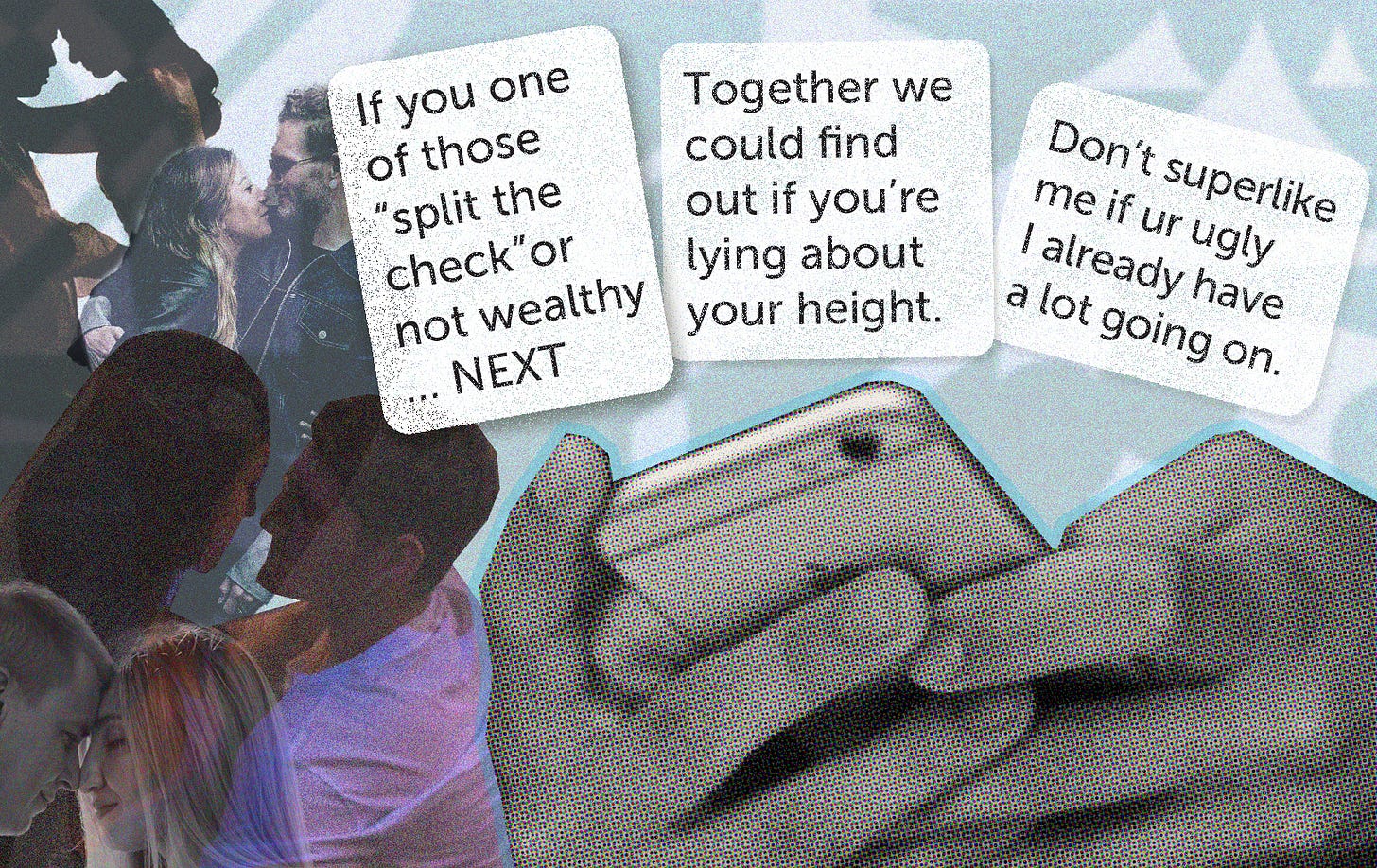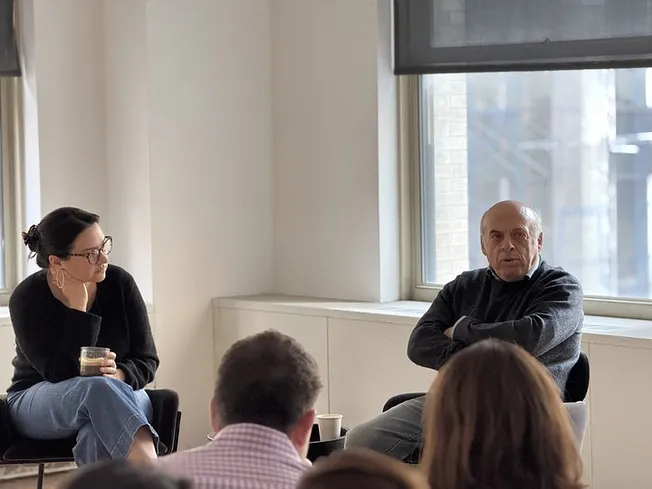If you’re a regular reader of these pages, you know we believe in having tough conversations out loud. Which is why I’m thrilled that tonight, we are hosting our first-ever live debate, focusing on the crucial question:
Has the sexual revolution failed?
The relationship between the sexes and our epidemic of loneliness are two topics we find ourselves continually returning to at The Free Press. Over the last few weeks, we have brought you a range of essays on these themes—from Jenny Powers on the surprising rise of phone sex operators to Rob Henderson on the decline of marriage. Kat Rosenfield introduced us to the new female pickup artists, while our high school essay finalist Isabel Hogben revealed how she discovered porn when she was just 10 years old.
Now, Free Press writer Olivia Reingold reports on the increasing number of young men dropping out of the dating pool. This is a hugely important subject, and I look forward to hearing your thoughts in the comments.
Meanwhile, if you’re coming to our debate tonight at the Ace Theatre in L.A., we can’t wait to meet you in person. (About 20 tickets are still available, grab one now!) If you can’t make it, don’t worry—we’ll send out a recording soon. And stay tuned for more live events from The Free Press in the future, because while this is our first, it most definitely won’t be our last.
—BW
“Are you religious?”
The question made Jammall squirm. The answer was no, but he could tell his date wanted it to be yes. And after the hour-long drive to get here, to a Caribbean restaurant in Orlando, Florida, he could tell it wasn’t working.
“I think we should just be friends,” the 36-year-old security guard remembers telling the girl he had dinner with last month after they met on Facebook.
That was his first date in three years. He says he once went six months without getting a single match on a dating app, even though he pays $30 in monthly fees between OkCupid, Bumble, and Hinge. If you count high school, when he went to the movies with a classmate, Jammall says he’s been on a total of three dates his entire life.
And now, driving home from his date, it hit him like a ton of bricks: Why do I even do this at all?
He walked into his apartment near Cape Canaveral, greeted the cats, and slumped down on his couch.
“I’m so far out of the loop,” he told me he realized at the time. “Compared to my peers, who have gone out with women, and know how to interact with them, I’m too far gone. I can’t learn that stuff.”
He trails off, then adds: “I’m just not going to try anymore. It’s not worth it.”
Jammall, who asked me to conceal his last name to protect his reputation at work, is one of a growing number of young men who are withdrawing from the dating pool. More than six in ten men aged 18 to 29 are now single, up from about five in ten in 2019, according to data from Pew Research Center. Respondents give a range of reasons for their singlehood, including having “more important priorities,” the fact they “just like being single,” or that they’ve gotten “too old” to keep trying.
But part of it also boils down to this: it’s hard for men to find partners at a moment when women are outpacing them both at school and work. Young women now hold 1.6 million more college degrees than men, and in a growing number of cities, including Los Angeles, Washington D.C., and New York, they make as much as—or more than—their male counterparts. And even if they become mothers, odds are four in ten will become the breadwinners of their households.
“What discourages me so much is that most of the women that I’ve seen on dating sites, they want a man making as much as them and they’re making upwards of like, $100,000,” said Jammall, who tells me he makes $55,000 a year.
“A lot of men are checking out,” he adds. “We’re just tired. We’re just tired of being told that we don’t measure up either physically or financially.”
I found Jammall on the online Reddit community r/TrueUnpopularOpinion, where men often vent about the dating scene. On another subreddit, r/PurplePillDebate, male commenters bemoan that they’re held to the “666 rule,” which mandates they be six feet tall, make six figures, and have six inches—or more—downstairs. (Jammall describes himself as a “straitlaced guy” who is 5-feet-5-inches tall.)
The men I spoke with—ranging from ages 17 to 33 and living in rural New Jersey to Austin, Texas—said they felt overlooked in a competitive dating market, where women often list salary requirements and height preferences on their profiles.
To see if things were as bad as they claimed, I joined two major dating platforms—Tinder and Hinge—and posed as a hip, 30-year-old business owner with a full head of hair and a degree from NYU. A few swipes in, I spotted a busty blonde leaning over in a halter dress with the caption, “Together we could find out if you’re lying about your height.”
Then, a 22-year-old, captured in a selfie at her work cubicle with her cleavage resting on her desk, wrote: “Don’t superlike me if ur ugly I already have a lot going on.”
Another woman, a five-feet-two-inch bombshell named Ashly, warned men: “If you [are] one of those ‘split the check’ or not wealthy. . . NEXT.”
That financial pressure is what screws men over most, said Jess Carbino, the former in-house sociologist for Tinder and Bumble.
“The traditional markers of adulthood like buying a home, completing college, and getting married, are all becoming far harder to achieve,” Carbino said. “Many men perceive themselves to be far less marriageable. And in turn, many women perceive them to be less marriageable, too.”
She says it’s never been easy to be Joe Average on the dating market but things are rougher now that the average man’s salary, which hovers just above $61,000 in the U.S., is hardly enough to afford rent in most major American cities. Yet still, many women hold out for men who make not just as much or more than they do, but are also wildly attractive.
While the sexual revolution freed women from depending on men for income or stability, it also means they can privilege more “frivolous” qualities in a mate, says Rob Henderson, a psychology PhD with a Substack on social mores.
“People used to care a bit more deeply about moral character and hard work, and whether the person was an ethical and upstanding citizen,” he tells me. “And now, you don’t have to worry about that quite as much. And you can sort of focus on things that are just, like, more immediate, like attraction.”
The result? Men at the tip-top of the dating pool get everything. And the men who don’t have it all get nothing.
But even the alphas are feeling the squeeze.
One New York City–based psychologist, David Gordon, says many of the high-powered men he treats—including doctors, lawyers, and financiers—fret over their ability to attract a woman, despite their enviable salaries or careers.
“It’s kind of sad or tragic, but some guys will look at their bank accounts, stocks, or credit score every day, as if it’s some sort of measure of their value,” he says. “We can look at the numbers, and I’m like, ‘Dude, looks pretty good to me.’ ”
Still, he says, “There’s this anxiety around—is this enough?”
That’s the insecurity that keeps Santiago, a 25-year-old from Albuquerque, New Mexico, up at night. The last time he dated anyone was in 2021—but that ended when he suspected she was cheating on him. Now, with the wounds still raw, he fears he’s “not worthy” of a girlfriend anymore.
“After being depressed for so long, I feel like it’s a handicap,” says Santiago, who works at a department store and has been on one date only since his breakup. “It makes me feel like, ‘Oh, he’s damaged goods.’ ”
And then there’s the problem of not knowing how to approach a woman. He suspects his coworker might have a crush on him, and yet he worries that one wrong move and he’ll be labeled “creepy.”
It’s a common worry for men in the post–#MeToo era. In a 2016 study, over 95 percent of respondents replied that men were much more likely to be “creepy people” than women. One twentysomething on Reddit, who wanted to ask out an employee at his local pet store, groaned that men are “expected to be the hunters but are shunned for doing so in public unless it’s on a stupid app.”
So Santiago does nothing.
“I’m a very insecure person—I don’t want to burst anyone’s bubble or break their boundaries,” said the third-generation Mexican American.
And then there’s the cost of romance. The average date in the U.S. comes with a $159 price tag, which costs more than ten hours of work for those making a $15 hourly wage. It started getting so expensive for one bachelor, a 26-year-old banker, that he moved from Los Angeles, where rent averages around $3,000, to an apartment in Appalachia, where he and a friend now pay $500 each a month.
“I just found it’s a lot of time, and frankly, money,” he says about dating back West. “We’re risking so much for so little.”
But the dating scene in Appalachia, he says, is “not good” either, partly because he’s working remotely.
“Everyone is double my age and lives in, like, the Midwest. There’s just none of that cohesion or fun. The world has changed.”
Some men insist they haven’t checked out of dating. Rather, they have virtual girlfriends who satisfy all their needs.
Over the past few years, start-ups like Replika, Character.ai, and Inflection AI, have rolled out a universe of virtual companions that users can customize to meet their every desire. One alluring chatbot, Eva AI, woos customers with the promise: “Build relationship and intimacy on your terms.” And one influencer, Caryn Marjorie, says she created an AI version of herself—so far with more than 18,000 “boyfriends”—to “cure loneliness.”
And then there are the real-life sirens of OnlyFans, where its 240 million users can purchase the “girlfriend experience,” and get a constant stream of sexts and loving messages in return for cold, hard cash.
Aella, a top OnlyFans performer who makes $100,000 on “a good month,” says a large part of her job is doting upon her admirers like a lover would, listening to them moan about their tough days or absent girlfriends.
“It turns out the thing that men want is not just sex,” she told The Free Press. “They want sex with a woman that likes them.”
Only a minority of her customers are interested in just physical pleasure, she says. An overwhelming majority reach out to her for companionship, or simply to feel desired by a woman. A “big part” of her job, she says, is tending to men who are lonely.
“An important component to a sexual dynamic is to feel valued,” she told me.
Ethan King, a therapist who “treats 90 percent men” in Austin, Texas, says he often has to convince clients to look beyond the girls they see in porn.
“People say they’re totally happy with their porn girlfriend,” he says. “They’re like, ‘It’s too risky. I’d just rather be online.’ ”
But Ian Soltes, a 33-year-old overnight gas station attendant in Bridgeport, Connecticut, doesn’t want to look past his online “friend with benefits.”
He says he first met his online girlfriend on GameFAQs, a video gaming website that hosts message boards, when he was 13 or 14. They play video games together and message each other all day long (he told me he sent her a “hug emoji” during our interview).
“She has been more than willing to be very close and intimate with me online,” he said. “So any sexual urge I’ve had has been handled by that.”
There’s just one problem: they’ve never met in person or spoken on the phone. Soltes said she can’t because she’s mute.
“I’m pretty convinced it’s a lie,” he admitted. “But at the same time, if I challenge her on it, what’s going to happen? I’m going to find out the one person I’ve been close friends with for decades now is a guy? I don’t want to say I already know that, ’cause I don’t.”
He stumbles to find the right words.
“I’d just be losing a close friend, and I don’t want to risk that.”
The U.S. marriage rate is the lowest it’s been in over a century, with a quarter of 40-year-olds having never married (in 1980, only 6 percent of adults fell into that camp). It’s a trend that continues even though research shows married people are happier.
Americans today “discourage commitment now,” says Steven Mosher, the lead demographer at the Population Research Institute. “The expectation 50 years ago was that everyone would eventually get married and have children. Now, that expectation is gone.”
Already, an increasing number of women are going it alone as mothers, freezing their eggs and using sperm donors to procreate. At some point in the future, Mosher says the family—“the fundamental unit of society”—could completely break down. “We’re going to have children born from sperm donors, with no fathers, eggs and embryos frozen suspended indefinitely until someone wants to add a child to her life.
“This is not a happy future for most of humanity.”
Jon Birger worries about the future, too. Not just for men but for women, who he says aren’t being served by the current dating dynamic—or dating apps, which about half of American “never married” adults say they’ve used at some point.
“Their business goal is to retain users,” says Birger of apps like Tinder that want daters to keep searching for love. The day you settle down is the day their profits die.
His advice to America’s young women is to get off the apps and try “mixed-collar dating.”
“When college-educated women restrict their dating pool to college-educated men, they are effectively limiting themselves to a too-small dating pool,” said Birger, the author of Date-onomics: How Dating Became a Lopsided Numbers Game. “And if you exclude firemen, electricians, plumbers, and other folks that don’t have a college degree, you may be excluding people that you would actually really click with romantically.”
Jammall, the security guard in Florida, says he is open to dating someone more educated or successful than he is, and he believes he could bring a lot to the table. Sure, he doesn’t have a million dollars, but he wants to do “the little things,” like cook dinner for his partner and leave love notes around the house. “I’m trustworthy, loyal, and very direct. I’m also very protective, and I’m not afraid to try new things.”
But still, he knows that many women toggle their apps so that men like him—those without a bachelor’s degree, without a six-figure salary—never appear on their feeds.
And he says they’re “missing out” on a lot of good guys.
“The problem isn’t that I don’t have anything to offer someone—I do,” he says. “But I can’t even get my foot in the door. And if they don’t talk to me, what can I do?”
CORRECTION: An earlier version of this article stated that a quarter of adults under 40 have never been married. At present, a quarter of 40-year-olds have never been married, compared to 6 percent in 1980. We regret the error. Thanks to reader David Ross, PhD, for bringing it to our attention.
Olivia Reingold is a reporter for The Free Press. Read her piece about the decline of warriors among a tribe in Montana, and follow her on Twitter (now X) @Olivia_Reingold.
Become a Free Press subscriber today:















our Comments
Use common sense here: disagree, debate, but don't be a .